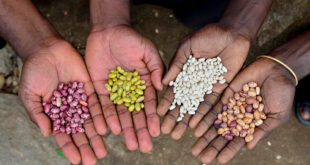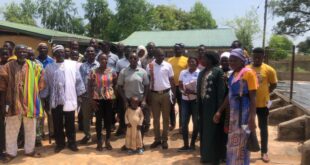 Tamale, Ghana – A new dawn in commercial rice production is currently taking place in Northern Ghana, a development some agricultural and food security analyst consider as good news for the entire North and the country Ghana in general.
Tamale, Ghana – A new dawn in commercial rice production is currently taking place in Northern Ghana, a development some agricultural and food security analyst consider as good news for the entire North and the country Ghana in general.
Abanga Farms, a subsidiary of A & G Agromechanical Industries Limited based in Tamale in the Northern Region of Ghana, cultivated 1,200 acres of rice during the 2017 farming season.
This was by far, the largest rice farm ever cultivated by any single individual or organization in the area considering the lack of farm implements and inputs as well as other challenges that many farmers face.
The number of acres according to the Managing Director of Abanga Farms, Thomas Abanga in an interview with Savannahnews, would be increased to 6000 acres (5 times) the initial acreage in the 2018 farming season.
This may sound very ambitious to many people who know the climate and topography of the North but Mr. Abanga says “I’m leaving no stone unturned to make sure that my beloved country becomes food sufficient and secured and also be able to export to the international market.
“When Ghana becomes food sufficient with rice in abundance who will import rice into the country again? He quizzed, stressing that “there’s the need for this kind of revolution I’m leading in order to contribute significantly to the country’s gross domestic product.
“I know the weather can sometimes fail farmers because of the negative effects of climate change. And so, I am combing the rainfall and irrigation to do this business. Besides, I have the farm machinery and human resources to farm the 6000 acres I’m targeting”, he indicated.
Abanga Farms is using a variety of rice known as AGRA rice which is being promoted by Africa Rice under the Rice Seed Scaling project. The first trial of 1,200 acres at Guo in the North Gonja District of the Northern Region was very successful according to Mr. Abanga.
The Northern Regional Director of Agric, William Boakye-Acheampong has since commended Managing Director of Abanga Farms in a recent visit to the 1,200 acre rice farm saying “it would contribute to high rice harvest in the country”, he told the GNA.
A Senior Agriculture Research Scientist at the Savannah Agricultural Research Institute (SARI) of the Council for Scientific and Industrial Research, Dr. Wilson Dogbe also described the farm as “one of the most impressive large scale rice farms in the country”, adding that “it was being managed according to good agronomic practices to guarantee high yields”.
For many years, approximately in the last two decades or so, successive governments have resorted to the indirect importation of foreign rice from South-East Asia and North America.
An estimated 400,000 metric tons of rice, an equivalent of about US$600milion, are imported yearly into the Ghanaian domestic market for consumption.
This has ballooned the country’s rate of access to foreign exchange as more foreign currencies particular the United States dollar is always in high demand for local and foreign importers.
As a result of the high demand for the dollar, the cedi keeps depreciating all the time thereby leading to high inflation and high cost of borrowing from banks.
By Savannahnews with files from GNA
 Savannah News Online Reporting Only What Matters Most
Savannah News Online Reporting Only What Matters Most



